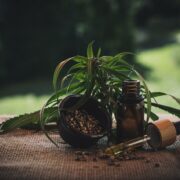
How CBD Oil Can Help With Post Traumatic Stress Disorder
In addition to CBD’s well-known capacity to treat anxiety, pain, and autoimmune diseases, research shows that it may also be useful for reducing the symptoms of post-traumatic stress disorder (PTSD).
When you think about PTSD, you might picture “shell-shocked” veterans suffering from emotional fallout after witnessing unthinkably violent acts on the battlefield.
Indeed, combat experience is a very significant and widely recognized contributor to the development of PTSD. The U.S. Department of Veterans Affairs estimates that as much as 30% of veterans will have PTSD following their service. [1]
But PTSD doesn’t only affect members of the military – it can also occur in people who experience trauma of any kind, such as physical or emotional abuse, a car accident or near-death experience, or losing one’s home to a fire.
Military experience aside, roughly 10% of all American adults will be diagnosed with PTSD at some point in their lives. [2]
People living with PTSD often experience flashbacks, mentally reliving their traumatic memories to an extent that interferes with their daily functioning and emotional wellbeing.
These persistent recurring memories can lead to difficulty sleeping, nightmares, severe anxiety, and depression. Episodes of overwhelming fear, anger, or sadness are also common. [2]
When suffering from PTSD, people frequently avoid situations that remind them of their trauma. Depending on the nature of a person’s trauma, those situations can be wide-ranging, and, in severe cases, the sufferer may opt to avoid leaving home altogether.
Needless to say, PTSD is a debilitating condition that can wreak havoc on the lives of those who experience it.

PTSD Overview
PTSD can generally be broken down into four stages: impact, denial, short-term recovery, and long-term recovery.
Impact stage: The affected person deals with the immediate fallout from the traumatic event. This stage is often characterized by feelings of shock, fear, helplessness, and guilt. [3]
Denial stage: Involves avoidance of difficult thoughts and feelings. This stage is particularly dangerous, as many people may find that it’s easier to temporarily numb themselves through substance abuse than it is to confront the pain of their emotions.
Short-term recovery stage: The affected person begins to acknowledge the trauma he or she experienced, and attempts to transition back into “normal” life. The adaptations a person makes to cope in this stage can be healthy (e.g. talking with a therapist, finding support from other trauma survivors) or unhealthy (e.g. isolating oneself to avoid the dangers of the outside world).
Long-term recovery stage: The person works to process the trauma, and ideally manages to frame it in such a way that he or she can move forward with life in a productive manner. Since the memory of trauma never fully goes away, this stage is often a life-long process. [4]

PTSD Treatment
Unfortunately, there is no simple cure for PTSD. Each case is different, and recovery takes time.
Rehabilitation from PTSD usually involves therapy and prescription medications, including antidepressants, antipsychotics, and anxiolytics.
PTSD treatment has two primary goals:
- to teach patients skills to help them deal with their trauma, and
- to improve the symptoms (flashbacks, anxiety, insomnia, etc.) that interfere with their daily lives. [5]
If you’re suffering from PTSD, the most important first step is to speak with a qualified mental health practitioner.
There is absolutely NO shame in seeking help, and anyone who implies otherwise is sadly mistaken. Admitting when you need support is an act of courage in and of itself.
Only a mental health professional can teach you the skills you need to prevent trauma from dominating your life, such as relaxation techniques, gradual desensitization to stress triggers, and the challenging of negative assumptions that contribute to anxiety.
Therapy is universally recognized as the cornerstone of successful PTSD treatment. Research shows that it speeds recovery time and reduces symptoms such as nightmares and reclusive behaviors. [6]
However, while it’s undisputed that therapy is helpful for those with PTSD, the topic of medication – the second most common component of PTSD treatment – is more controversial.
There are several reasons for this.
For one, medications commonly prescribed for PTSD have been shown to be more effective for men than they are for women. [7]
Also, they typically work better for mild cases of PTSD than they do for more severe cases. [8] One study by researchers associated with the Department of Veterans Affairs even found that an antipsychotic drug commonly prescribed for PTSD was no more effective at reducing symptoms in treatment-resistant cases than a placebo. [9]
And last but certainly not least, many medications used to treat PTSD come with detrimental side effects including fatigue, insomnia, nausea, diarrhea, weight gain, mood swings, and dependence. [10, 6]
So while medication can be helpful for some people with PTSD, it doesn’t help everyone – and those that it does help often experience unwanted side effects.
Thankfully, CBD may be a game-changer in this regard.
When it comes to managing the symptoms of PTSD, mounting evidence shows that CBD may offer hope where traditional medications fall short.

How Does CBD Help With PTSD?
Nothing can negate the importance of therapy for those recovering from PTSD, but research shows that CBD may help to mitigate many of PTSD’s worst symptoms.
Here are a few ways it does this:
CBD speeds up aversive memory extinction
Aversive memory extinction is the process of the brain “letting go” of fear associated with certain triggers.
For example, a veteran with combat-related PTSD may associate loud noises with memories of gunfire and explosions. This could cause him to feel fear and anxiety whenever he hears loud sounds, even if they’re just coming from construction work being done at the house next door.
If, over time, this person progresses to the point that such triggers no longer cause him anxiety, he’s gone through the process of aversive memory extinction – his brain has stopped associating loud noises with the threat they represented in his past.
The endocannabinoid system plays a key role in aversive memory extinction. (By the way, if you’re curious about the endocannabinoid system, we’ve written an entire blog post on the subject – see The Endocannabinoid System: What It Is and How It Works).
By supporting proper functioning of the endocannabinoid system, studies show that “CBD can facilitate the extinction of aversive memories not only in animals, but also in humans” (Bitencourt & Takahashi, 2018).
In other words, CBD supplementation can decrease the amount of time it takes for a patient with PTSD to let go of certain fears and achieve a significant breakthrough in his or her recovery.
That’s no small feat!
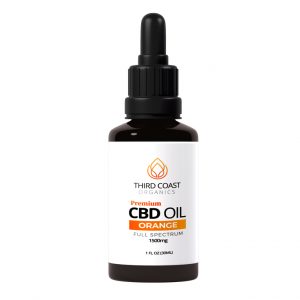
For a limited time, get 15% OFF all Third Coast Organics CBD oil tinctures by entering code THANKYOU15 at checkout!
CBD decreases anxiety
Anxiety is one of the most common symptoms of PTSD.
And in many cases, it doesn’t just arise in response to certain triggers – for countless patients with PTSD, anxiety is a constant, day-in-and-day-out struggle.
Fortunately, CBD has been consistently proven to reduce anxiety. In fact, anxiety is one of the most common issues people use CBD to alleviate.
CBD decreases anxiety in multiple ways. For a more in-depth exploration of this topic, check out our post on 3 Incredible Ways CBD Reduces Anxiety.
One of the key ways CBD works to stop anxiety in its tracks is by increasing the body’s levels of anandamide, an endocannabinoid associated with feelings of pleasure and reward. [12]
By increasing the amount of anandamide in the brain, CBD can help PTSD patients enter a more relaxed and pleasant state of mind, leaving less room for feelings of anxiety to creep in.
CBD can lead to better sleep
People suffering from PTSD often report sleep problems such as nightmares and insomnia.
CBD may promote better sleep by decreasing anxiety – after all, it’s hard to fall asleep (much less have pleasant dreams) when you’re feeling anxious.
Studies have found that CBD increases both total sleep time and REM sleep time in rodents. [13]
Research on using CBD for specific sleep problems in humans is still in its early stages, but so far, “for patients who suffer through the misery of insomnia, studies suggest that CBD may help with both falling asleep and staying asleep” (Grinspoon, 2020).
If you’ve ever gone to bed only to find yourself staring at the ceiling with invasive thoughts that won’t go away, CBD could be worth a try!
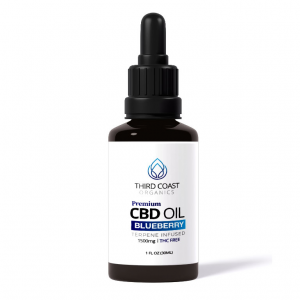
Don’t forget – you can get 15% OFF all Third Coast Organics CBD oil tinctures by entering code THANKYOU15 at checkout!
CBD has no serious side effects
Remember those pesky side effects I mentioned earlier?
When taking antidepressants, antipsychotics, and anxiolytics commonly prescribed to treat PTSD, patients often experience fatigue, insomnia, nausea, diarrhea, weight gain, mood swings, and dependence.
And by the way, these are just the most common side effects – many others are possible as well.
CBD, on the other hand, is completely natural, and “has been proved to be well tolerated by humans, both in overall safety and possible side effects” (Bitencourt & Takahashi, 2018).
And don’t worry about becoming addicted, either: according to a report by the World Health Organization, “CBD exhibits no effects indicative of any abuse or dependence potential…. To date, there is no evidence of public health related problems associated with the use of pure CBD” (World Health Organization, 2017).
For those whose medication options are limited by unwanted side effects or a predisposition for addiction, CBD offers a safe and effective alternative.
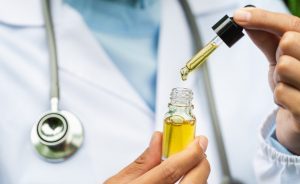
Take A Stand Against PTSD – Try CBD Today!
PTSD can dramatically change a person’s life.
Whether it arises after military service, a significant personal loss, or any other form of trauma, it may seem like things can never return to normal again.
But with the help of a mental health professional, recovery from PTSD can be achieved – and in the meantime, CBD can help to curb some of its worst symptoms.
If you want to try CBD for yourself, click here to shop our wide variety of premium, organic, USA-grown-and-processed CBD products. Don’t forget to use code THANKYOU15 to get 15% OFF all of our CBD oil tinctures!
And if you have friends or loved ones suffering from PTSD, share this article on social media. You just might change their lives.
References
- U.S. Department of Veterans Affairs (2018). How common is PTSD in veterans? Retrieved from https://www.ptsd.va.gov/understand/common/common_veterans.asp
- American Psychiatric Association (2020). What is posttraumatic stress disorder? Retrieved from https://www.psychiatry.org/patients-families/ptsd/what-is-ptsd
- Bennett, T. (2020). What are the four phases of PTSD? Retrieved from https://thriveworks.com/blog/four-phases-ptsd-impact-rescue-intermediate-recovery-long-term-reconstruction/
- Pyramid Healthcare (2020). What are the stages of PTSD? Retrieved from https://pyramidfbh.com/what-are-the-stages-of-ptsd/
- Bhandari, S. (2020). 6 common treatments for PTSD (post-traumatic stress disorder). Retrieved from https://www.webmd.com/mental-health/what-are-treatments-for-posttraumatic-stress-disorder
- Carey, B. (2011). Drugs found ineffective for veterans’ stress. Retrieved from https://www.nytimes.com/2011/08/03/health/research/03psych.html
- Brady, K., Pearlstein, T., & Asnis, G. (2000). Efficacy and safety of sertraline treatment of posttraumatic stress disorder. Retrieved from https://jamanetwork.com/journals/jama/fullarticle/192575
- Hertzberg, M. A., Feldman, M. E., Beckham, J. C., Kudler, H. S., & Davidson, J. R. (2000). Lack of efficacy for fluoxetine in PTSD: a placebo controlled trial in combat veterans. Annals of clinical psychiatry: official journal of the American Academy of Clinical Psychiatrists, 12(2), 101–105. https://doi.org/10.1023/a:1009076231175
- Krystal, J. H., Rosenheck, R. A., & Cramer, J. A. (2011). Adjunctive risperidone treatment for antidepressant-resistant symptoms of chronic military service–related PTSD. Retrieved from https://jamanetwork.com/journals/jama/fullarticle/1104803
- Alexander, W. (2012). Pharmacotherapy for post-traumatic stress disorder in combat veterans: focus on antidepressants and atypical antipsychotic agents. Retrieved from https://www.ncbi.nlm.nih.gov/pmc/articles/PMC3278188/
- Bitencourt, R., & Takahashi, R. (2018). Cannabidiol as a therapeutic alternative for post-traumatic stress disorder: From bench research to confirmation in human trials. Retrieved from https://www.ncbi.nlm.nih.gov/pmc/articles/PMC6066583/
- Bedse, G. et al. (2018). Therapeutic endocannabinoid augmentation for mood and anxiety disorders: comparative profiling of FAAH, MAGL, and dual inhibitors. Translational psychiatry, 8 (1), 92.
- Chagas, M.H., Crippa, J.A., Zuardi, A.W., Hallak, J.E., Machado-de-Sousa, J.P., Hirotsu, C., Maia, L., Tufik, S., & Andersen, M.L. (2013). Effects of acute systemic administration of cannabidiol on sleep-wake cycle in rats. Retrieved from https://pubmed.ncbi.nlm.nih.gov/23343597/
- Grinspoon, P. (2020). Cannabidiol (CBD) – what we know and what we don’t. Retrieved from https://www.health.harvard.edu/blog/cannabidiol-cbd-what-we-know-and-what-we-dont-2018082414476
- World Health Organization (2017). Cannabidiol (CBD): pre-review report. Geneva, Switzerland: Author. Retrieved from www.who.int/medicines/access/controlled-substances/5.2_CBD.pdf
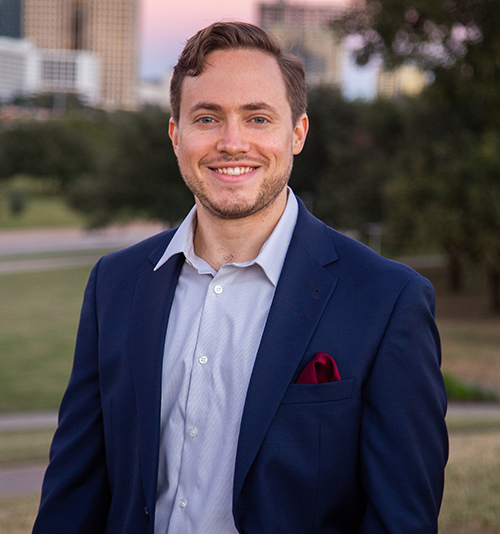
Thomas Allred is a freelance writer and licensed Physical Therapist Assistant with a BA in psychology from Texas A&M University. He developed a keen interest in CBD during a 10-year struggle with uncontrolled epilepsy. When he’s not writing, Thomas enjoys cooking, playing guitar very badly, and exploring Austin with his wife and dog. Find him online at www.thomasallredwriting.com.
